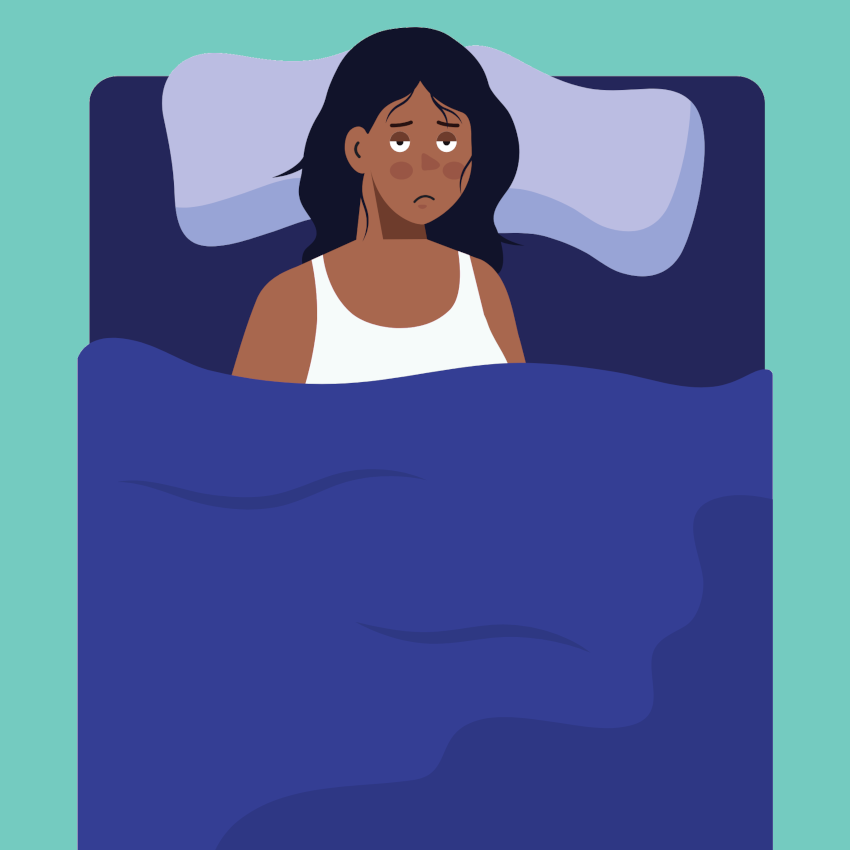
Sleeplessness (insomnia)
When you have trouble falling asleep, staying asleep, or wake up too early, and it happens often, even when you feel tired.
Remember: having a bad night once in a while is normal. It becomes a problem when it lasts for weeks and makes you feel exhausted during the day.
Try now
- Breathing 4-7-8: inhale 4 sec, hold 7 sec, exhale 8 sec. Repeat 4 times.
- Think about 3 small things you’re grateful for from the day.
How do you recognize it
(It’s different for everyone)
Super common
- Lying awake a long time before falling asleep
- Waking up often during the night
- Waking up too early and can’t fall back asleep
- Feeling tired, irritable, or having trouble focusing during the day
Common
- Headaches or tense muscles
- Worrying or overthinking at night
- Fear of “not sleeping again”
Sometimes
- Feeling low or depressed
- More sensitive to stress or physical complaints
When to go to the doctor?
- Awake for 30+ min
- 3+ times a night
- 3+ times a week
- 3+ weeks in one month
- For 3+ months
Where can I find help?
Go to Resources.
Call 912 now
if you’re in immediate danger or badly hurt
Yama of chat 918!
Bo por yama tambe òf chat ku e number 918 (Djaluna pa Djabierne 10:00-18:00, Djasabra 12:00-18:00) Anonimo i gratis pa mucha, hoben i adulto te ku 25 aña.
Chat 24/7 ku 113
Si bo no ta wòri pa papia Ingles òf Hulandes, tin un chat 24/7 disponibel pa prevenshon di suisidio.
Tips
In the moment if you can’t fall asleep
- Don’t fight it.
- Get out of bed. Do something else (no phone), and come back when you’re tired.
- Don’t focus on the stressful, but be grateful, switch “I only have … time left”, to focussing on the fact that you get to lay in a comfortable bed and you don’t have anything to do.
- Do not look at the clock. It will make you angry and frustrated
- Try something relaxing: breathing exercises, read a book, listen to music.
- Remind yourself: “If I don’t sleep perfectly, I’ll still get through tomorrow.” or "Even though I might not get the amount of sleep I want, I’m still resting.”
- Write down the worries on your mind, so you can let them go and get back to them in the morning
- Try relaxing sounds like binaural beats, white noise or a sleep story
Long term
- Regularity: go to sleep and wake up at the same time (even in the weekend)
- Make a routine (30-60 minutes before bed): read a book, listen to music, journal (write down worries or tomorrow’s to do-list, so your brain can let go), do some stretching)
Example Routine (30–40 min)
-
-
- 10 min → Write down worries + tomorrow’s to-do list (empty your head).
- 5–10 min → Stretch gently or do breathing (4-7-8 method).
- 10–15 min → Read a book or listen to soft music.
- Go to bed → Lights off, no screens, room cool & quiet.
-
- Have your room around 18- 20 degrees celsius if you can
- Keep your room dark (black out curtains) or use a sleep mask. Try to stay away from screens for an hour before sleep.
- Also try to dim down the lights in your house an hour before to make your body understand that it’s time to sleep.
- Stay away from alcohol and caffeine.
- Regular movement in the day can help you fall asleep
- Keep your bed for sleep only. No homework, TV or scrolling
Exercises
- Breathing 4-7-8: inhale 4 sec, hold 7 sec, exhale 8 sec. Repeat 4 times.
- Progressive relaxation: tense muscles for 5 sec, release, move body part to body part.
- Box breathing (4-4-4-4): inhale 4 sec, hold 4 sec, exhale 4 sec, hold 4 sec. Repeat 5–10 rounds.
- Belly breathing: put one hand on your belly, inhale so it rises, exhale slowly so it falls. This shifts the body into relaxation mode.
- Think about 3 small things you’re grateful for from the day.






